高考英语易错语法知识点归纳
(全)高考英语语法-难点易错点归纳
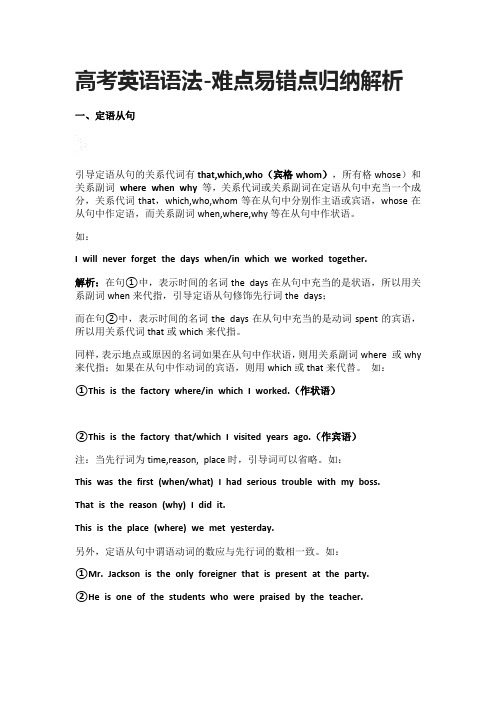
高考英语语法-难点易错点归纳解析一、定语从句引导定语从句的关系代词有that,which,who(宾格whom),所有格whose)和关系副词where when why等,关系代词或关系副词在定语从句中充当一个成分,关系代词that,which,who,whom等在从句中分别作主语或宾语,whose在从句中作定语,而关系副词when,where,why等在从句中作状语。
如:I will never forget the days when/in which we worked together.解析:在句①中,表示时间的名词the days在从句中充当的是状语,所以用关系副词when来代指,引导定语从句修饰先行词the days;而在句②中,表示时间的名词the days在从句中充当的是动词spent的宾语,所以用关系代词that或which来代指。
同样,表示地点或原因的名词如果在从句中作状语,则用关系副词where 或why 来代指;如果在从句中作动词的宾语,则用which或that来代替。
如:①This is the factory where/in which I worked.(作状语)②This is the factory that/which I visited years ago.(作宾语)注:当先行词为time,reason, place时,引导词可以省略。
如:This was the first (when/what) I had serious trouble with my boss.That is the reason (why) I did it.This is the place (where) we met yesterday.另外,定语从句中谓语动词的数应与先行词的数相一致。
如:①Mr.Jackson is the only foreigner that is present at the party.②He is one of the students who were praised by the teacher.解析:在句①中,先行词foreigner被only修饰,强调只有一个,所以从句中谓语动词用单数形式,而在句②中,who引导的定语从句修饰先行词the students,为复数,所以从句谓语动词应为复数。
高考英语语法填空常见8大易错点分析

高考语法填空中通常包含下列两种题型:(1)纯空格题:通常考冠词介词代词和连词等四类词。
一个空格只能填一个单词(2)用括号中所给词填空:通常考动词、形容词和副词的比较、词类转换,等级等。
一、不定冠词和定冠词的区别[解题技巧]下列情况很可能填(1)a_/an+可数名词(单数);+可数名词(单数);(2)a_/an+形容词+可数名词(单数)。
下列情况下很可能填(1)the最高级、序数词(2)the(+定语)+名词+不定式短语或分词短语(表示特指)。
考查语法点: 定冠词,不定冠词的用法考点:冠词(名词之前,无提示词)1.The race is known as Iditarod, and runs formthe town of Anchorage to the village of Nome,a journey of more than 1,800 kilometers.2.An abandoned nappy found next to a dirt track was the breakthrough rescuers needed to find the pair.3.Now years later, this river is one of the most outstanding examples of environmental clean up.二、介词的搭配无提示词:注意搭配问题与名词搭配构成介宾短语与不及物动词搭配构成动词短语与形容词搭配构成形容词短语考查语法点: 介词的基本用法及惯用搭配1、搭配名词advice/comment on;concern about;solution/key/answer/ to ; reason forat a low price……..2、搭配动词charge for;laugh at;rely on…..3、搭配形容词similar to;different from;famous as;worried about……1. The white background of the Olympic flag stands for peace and trust.2. He was well known to everyone in town, and they were all very fond of him.3. Oh, you make me so concerned about your health.4. She found some good quality schoolbags on sale.5. He was very tired of the boring job.6. He had a hard life without any contact(联系)with his family for years.三、反身代词的应用及 it 做形式宾语考查语法点: 代词的基本用法1. That would be a very reasonable thing to do in a big city, but it coulddestroy a small village like ours (we).2. Did you enjoy yourselves (you) at the party last night, girls?3.Each year, more than 2,300 international staff join their(they) 34,000locally hired colleagues to provide Medical aid.四、从句中的that , which, what 的选择1. I’m curious about what you’ll take in the college.2.But many people said Gatty was the real hero, which hurt Post.3.Police said they would figure out what led to his disappearance.4.The news that they told us cheered us all.五.谓语动词和非谓语动词的混淆1. When approaching(approach) the crossroads , the driver slowed his cardown and paid much attention to the traffic lights.2.When the driiver approached (approach) the crossroads , he slowed his cardown and paid much attention to the traffic lights.3.Slow your car before approaching (approach)the crossroads.六.过去分词与被动语态的混淆1.The English play performed(perform) by the students on Christmas Eve was abig success.2.The English play was performed (perform) by the students on Christmas Eve .It was a big success.3.The English play which was performed (perform) by the students on Christmas Eve was a big success.七.祈使句+连词+并列句/从句1.Hurry up, or you will be late.2.Work hard and you will make progress every day.3. Listen (listen) to the weather forecast so that you know when ahurricane is coming.八.副词伤---不起的ly形容词变副词通常是加ly,其变化有规律可循,请记住以下口诀:1.一般直接加,quick—quickly2.“元e”去e加,true—truly3.“辅y”改i加,happy—happily4.“le”结尾e改y。
高考易错英语知识点

高考易错英语知识点一、词义辨析在高考英语中,经常会出现一些词义相近的词汇,容易让学生混淆。
例如:accept和except,affect和effect,ascend和accent等。
这些词的拼写相似,但含义却截然不同。
在考试中,学生需要对这些词进行深入理解,并能够准确地运用于句子中。
二、动词时态动词时态是英语考试中经常出现的一个难点。
在现在时态和过去时态之间选择时,学生经常会迷失方向。
有些学生容易混淆过去完成时和过去时的用法,从而造成时态错误。
因此,在备考过程中,学生需要重点掌握各类动词的时态规则,并透彻理解不同时态在句子中的应用场景。
三、固定搭配英语中有许多固定搭配的词组,例如:take part in,make up,put up with等等。
对于这些固定搭配,学生需要进行积极的记忆和巩固,以免在考试中出现用词不当或语法错误。
四、非谓语动词非谓语动词包括不定式、现在分词和过去分词三种形式。
学生在应用非谓语动词时经常会遇到一些困难,例如:动词不定式的省略、现在分词和过去分词作定语等。
因此,在备考中,学生需要对非谓语动词及其用法进行充分的掌握和运用。
五、状语从句状语从句是高考英语中的一个难点,尤其是时间状语从句和条件状语从句。
学生在应用状语从句时经常会出现语法、逻辑和词汇方面的错误。
因此,学生需要在备考过程中,通过大量练习来提高对状语从句的理解和应用能力。
六、主谓一致主谓一致是英语语法中的一个重要知识点,也是高考中常出现的易错点。
学生在处理主谓一致时,需要注意词形、人称和单复数的统一。
此外,还有一些特殊的主谓一致规则需要学生掌握,例如:每一个、none、either和neither等词的用法。
七、虚拟语气虚拟语气是高考英语中一个重要的知识点。
学生在运用虚拟语气时经常会出现语法错误。
例如:与过去事实相反的虚拟语气的运用、虚拟语气的倒装结构等。
因此,学生需要通过大量的练习来加深对虚拟语气的理解和掌握。
高考英语状语从句易错考点归纳与分析
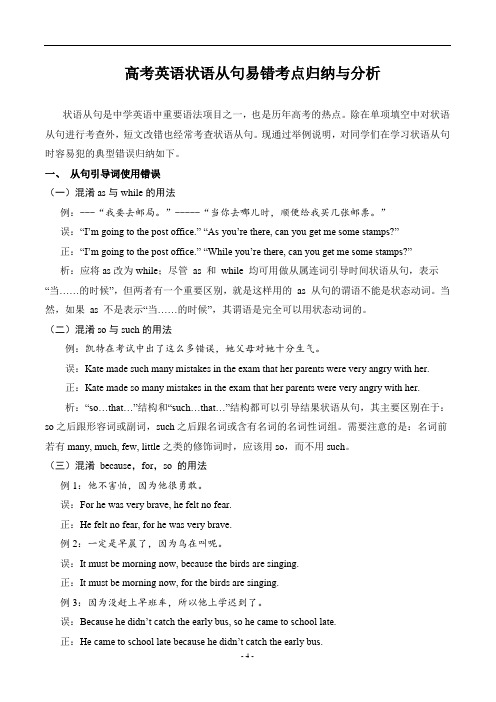
高考英语状语从句易错考点归纳与分析状语从句是中学英语中重要语法项目之一,也是历年高考的热点。
除在单项填空中对状语从句进行考查外,短文改错也经常考查状语从句。
现通过举例说明,对同学们在学习状语从句时容易犯的典型错误归纳如下。
一、从句引导词使用错误(一)混淆as与while的用法例:---“我要去邮局。
”-----“当你去哪儿时,顺便给我买几张邮票。
”误:“I’m going to the post office.” “As you’re there, can you get me some stamps?”正:“I’m going to the post office.” “While you’re there, can you get me some stamps?”析:应将as改为while;尽管as 和while 均可用做从属连词引导时间状语从句,表示“当……的时候”,但两者有一个重要区别,就是这样用的as 从句的谓语不能是状态动词。
当然,如果as 不是表示“当……的时候”,其谓语是完全可以用状态动词的。
(二)混淆so与such的用法例:凯特在考试中出了这么多错误,她父母对她十分生气。
误:Kate made such many mistakes in the exam that her parents were very angry with her.正:Kate made so many mistakes in the exam that her parents were very angry with her.析:“so…that…”结构和“such…that…”结构都可以引导结果状语从句,其主要区别在于:so之后跟形容词或副词,such之后跟名词或含有名词的名词性词组。
需要注意的是:名词前若有many, much, few, little之类的修饰词时,应该用so,而不用such。
(三)混淆because,for,so 的用法例1:他不害怕,因为他很勇敢。
高中英语 高考语法易错知识点8.非谓语动词(考点梳理+易错点)
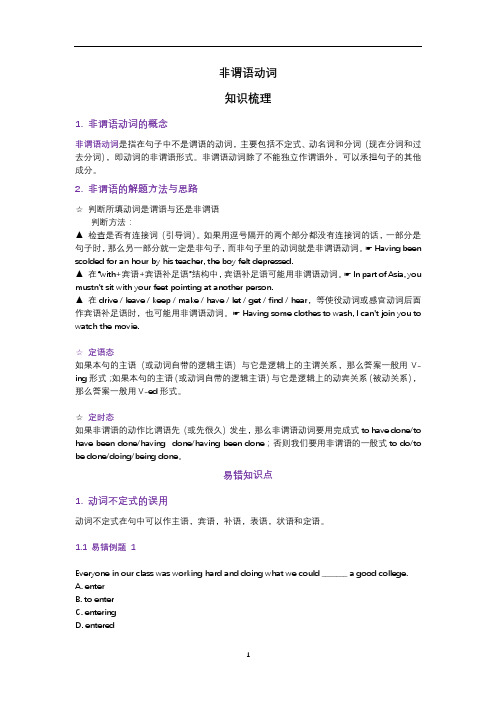
非谓语动词知识梳理1. 非谓语动词的概念非谓语动词是指在句子中不是谓语的动词,主要包括不定式、动名词和分词(现在分词和过去分词),即动词的非谓语形式。
非谓语动词除了不能独立作谓语外,可以承担句子的其他成分。
2. 非谓语的解题方法与思路☆判断所填动词是谓语与还是非谓语判断方法:▲检查是否有连接词(引导词)。
如果用逗号隔开的两个部分都没有连接词的话,一部分是句子时,那么另一部分就一定是非句子,而非句子里的动词就是非谓语动词。
☛ Having been scolded for an hour by his teacher, the boy felt depressed.▲在“with+宾语+宾语补足语”结构中,宾语补足语可能用非谓语动词。
☛ In part of Asia, you mustn't sit with your feet pointing at another person.▲在drive / leave / keep / make / have / let / get / find / hear,等使役动词或感官动词后面作宾语补足语时,也可能用非谓语动词。
☛ Having some clothes to wash, I can't join you to watch the movie.☆定语态如果本句的主语(或动词自带的逻辑主语)与它是逻辑上的主谓关系,那么答案一般用V-ing形式;如果本句的主语(或动词自带的逻辑主语)与它是逻辑上的动宾关系(被动关系),那么答案一般用V-ed形式。
☆定时态如果非谓语的动作比谓语先(或先很久)发生,那么非谓语动词要用完成式to have done/to have been done/having done/having been done;否则我们要用非谓语的一般式to do/to be done/doing/being done。
易错知识点1. 动词不定式的误用动词不定式在句中可以作主语,宾语,补语,表语,状语和定语。
高考英语语法易错点全归纳

高考英语语法易错点全归纳一、定语从句引导定语从句的关系代词有that,which,who(宾格whom),所有格whose)和关系副词where when why等,关系代词或关系副词在定语从句中充当一个成分,关系代词that,which,who,whom等在从句中分别作主语或宾语,whose在从句中作定语,而关系副词when,where,why等在从句中作状语。
如:①I will never forget the days when/in which we worked together.②I will never forget the days which/that we spent together.解析:在句①中,表示时间的名词the days在从句中充当的是状语,所以用关系副词when来代指,引导定语从句修饰先行词the days;而在句②中,表示时间的名词the days在从句中充当的是动词spent的宾语,所以用关系代词that或which来代指。
同样,表示地点或原因的名词如果在从句中作状语,则用关系副词where或why来代指;如果在从句中作动词的宾语,则用which或that来代替。
如:①This is the factory where/in which I worked.(作状语)②This is the factory that/which I visited years ago.(作宾语)注:当先行词为time,reason,place时,引导词可以省略。
如:①This was the first(when/what)I had serious trouble with my boss.②That is the reason(why)I did it.③This is the place(where)we met yesterday.另外,定语从句中谓语动词的数应与先行词的数相一致。
英语高考易错点整理
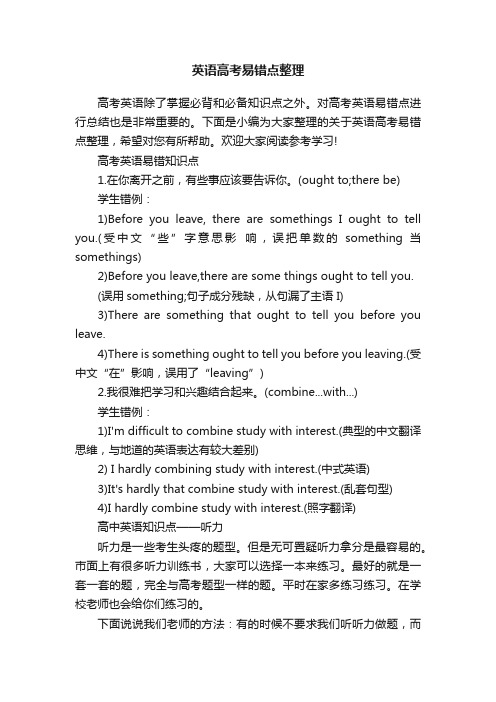
英语高考易错点整理高考英语除了掌握必背和必备知识点之外。
对高考英语易错点进行总结也是非常重要的。
下面是小编为大家整理的关于英语高考易错点整理,希望对您有所帮助。
欢迎大家阅读参考学习!高考英语易错知识点1.在你离开之前,有些事应该要告诉你。
(ought to;there be)学生错例:1)Before you leave, there are somethings I ought to tell you.(受中文“些”字意思影响,误把单数的something 当somethings)2)Before you leave,there are some things ought to tell you.(误用something;句子成分残缺,从句漏了主语 I)3)There are something that ought to tell you before you leave.4)There is something ought to tell you before you leaving.(受中文“在”影响,误用了“leaving”)2.我很难把学习和兴趣结合起来。
(combine...with...)学生错例:1)I'm difficult to combine study with interest.(典型的中文翻译思维,与地道的英语表达有较大差别)2) I hardly combining study with interest.(中式英语)3)It's hardly that combine study with interest.(乱套句型)4)I hardly combine study with interest.(照字翻译)高中英语知识点——听力听力是一些考生头疼的题型。
但是无可置疑听力拿分是最容易的。
市面上有很多听力训练书,大家可以选择一本来练习。
最好的就是一套一套的题,完全与高考题型一样的题。
2024年高考英语易错题(新高考专用)易错点07动词的时态和语态(4大陷阱)

易错点07 动词的时态和语态目录01 易错陷阱(4大陷阱)02 举一反三【易错点提醒一】一般现在时、一般过去时和现在完成时易混易错点【易错点提醒二】一般过去时和过去完成时易混易错点【易错点提醒三】现在完成时和过去完成时易混易错点【易错点提醒四】主动语态与被动语态易混易错点03 易错题通关易错陷阱1:一般现在时、一般过去时和现在完成时易混易错点。
【分析】【高考链接】(2023年浙江卷1月)The large siheyuan of these highranking officials and wealthy businessmen often________ (feature)beautifully carved and painted roof beams and pillars(柱子).【答案】featured【解析】考查动词时态。
句意:这些高级官员和有钱商人的高大的四合院,通常以雕刻精美和被粉刷的房顶横梁和柱子为特点。
分析句子结构可知,空格处需要填谓语动词,再结合and后动词时态可知,空格处应用一般过去时。
故填featured。
易错陷阱2:一般过去时和过去完成时易混易错点。
【分析】1.下列动词hope、wish、expect、think、intend、mean、suppose等,用过去完成时表示“原本……(事实上未能……)”。
2.This/It/That was the first/second/third ... time that ...表示“这/那是(某人)第几次做某事”,that从句中要用过去完成时。
3.hardly ... when ...和no sooner ... than ...两个句型中,主句均用过去完成时。
易错陷阱3:现在完成时和过去完成时易混易错点。
【分析】易错陷阱4:主动语态和被动语态易混易错点。
【分析】➢受母语干扰,翻译上下文时混淆被动语态与主动语态。
➢混淆谓语动词被动语态构词be+done与非谓语动词重点过去分词done。
备战2024年高考英语考试易错点24 语法填空:无提示词之冠词和介词(3大陷阱)(解析版)

易错点24无提示词之冠词和介词目录01易错陷阱(3大陷阱)02举一反三【易错点提醒一】冠词易混易错点【易错点提醒二】介词固定短语易混易错点【易错点提醒三】介词核心词义易混易错点03易错题通关易错陷阱1:冠词易混易错点。
【分析】冠词的错误在用法填空中主要有以下两条。
1.冠词固定短语掌握不牢。
2.只关注冠词的特指或泛指用法,忽略句子的逻辑意思,导致简单的句意复杂化。
3.冠词a与an的用法区别。
易错陷阱2:介词固定短语易混易错点。
【分析】介词的错误在用法填空中主要有以下四条。
1.含有介词的介词短语记忆不牢。
2.含有介词的动词短语记忆不牢。
3.含有介词的形容词短语记忆不牢。
易错陷阱3:介词核心词义易混易错点。
【分析】介词核心词义出错主要因为句子成分分析不清,句子逻辑意义不能理解,导致无法翻译介词的核心意思。
【易错点提醒一】冠词易混易错点【答案】a【解析】考查冠词。
句意:第二阶段,中伏,传统上是吃面条的时间,因为它可以帮助人们出汗和释放内心的热量。
此处time是可数名词,表示“一段时间”,且time发音是以辅音音素开头,应用a,表示泛指,故填a。
【变式1】(广东省深圳市四校学校2023-2024学年高三联考)The most representative among them is Lyu Opera,_____unique kind of the Chinese art form.【答案】a【解析】考查冠词。
句意:其中最具代表性的是吕剧,一种独特的中国艺术形式。
此处为泛指,且unique是发音以辅音音素开头的单词。
故填a。
【变式2】(2024届浙江省强基联盟高三仿真模拟卷)The Song and Yuan dynasties saw ________peak in the development of Chinese culture,and this coincided with the golden age of ancient books in China,says Chu Xiaobo,director of the Shanghai Museum.易错分析:长句子句子结构划分不清,句意理解出错,过度解读peak的特定含义。
高考英语语法易错点汇总

高考英语语法易错点汇总1. 主谓一致单复数不一致:The number of students is increasing.(“number”是单数)就近原则:Either the teacher or the students are going to attend the meeting.(“students”是复数)2. 时态一般现在时与现在进行时:He goes to school every day. (习惯动作) vs. He is going to school now. (正在进行)过去完成时:By the time he arrived, the train had left.将来时态:She will be here tomorrow. vs. She is going to be here tomorrow.3. 非谓语动词动名词与不定式:I enjoy reading books. vs. I want to read books.过去分词与现在分词:The broken window needs to be fixed. (过去分词表示被动) vs. The breaking news surprised everyone. (现在分词表示主动)4. 定语从句关系代词的使用:The man who is standing there is my father. (指人用who) vs. This is the book which I borrowed from the library. (指物用which)限制性与非限制性定语从句:My brother, who is a doctor, lives in New York. (非限制性) vs. The man who lives next door is a doctor. (限制性)5. 状语从句时间状语从句:I will call you when I get home.条件状语从句:If it rains, we will cancel the picnic.让步状语从句:Although he is tired, he continues to work.6. 虚拟语气与现在事实相反:If I were you, I would do it differently.与过去事实相反:If he had known, he would have acted differently.与将来事实相反:If it should rain tomorrow, we would cancel the trip.7. 冠词定冠词与不定冠词:He is a doctor. vs. He is the doctor who treated me.零冠词:I love music. (不可数名词前不加冠词)8. 代词人称代词:She and I are friends. (主格) vs. This is a gift for her and me. (宾格)指示代词:This is my book. That is yours.9. 介词时间介词:I will meet you at 5 o'clock. vs. I was born in 2000.地点介词:He is in the room. vs. He is at the door.10. 形容词与副词形容词修饰名词:He is a good student.副词修饰动词:He runs quickly.比较级与最高级:She is taller than her sister. vs. She is the tallest in her class.11. 倒装句部分倒装:Seldom do we see such talent. (强调副词放句首)完全倒装:Here comes the bus. (地点副词放句首)12. 强调句It is/was...that...:It is he who solved the problem.13. 一致性主语和谓语一致:Neither of the books is interesting.代词和先行词一致:Each of the students has his or her own book.14. 情态动词表示可能性:He might come tomorrow.表示义务:You must finish your homework.15. 数量词可数名词与不可数名词:I have a few friends. (可数) vs. I have a little money. (不可数) 16. 固定搭配动词短语:Look forward to (期待), Take care of (照顾)形容词短语:Be interested in (对...感兴趣), Be good at (擅长)17. 连词并列连词:and, but, or从属连词:because, although, if18. 比较结构比较级:She is taller than me.最高级:She is the tallest in her class.同级比较:She is as tall as her brother.19. 特殊句式感叹句:What a beautiful flower it is!祈使句:Please close the door.20. 动词的固定搭配动词与介词:depend on, look after动词与副词:give up, take off。
高考英语非谓语动词易错知识点
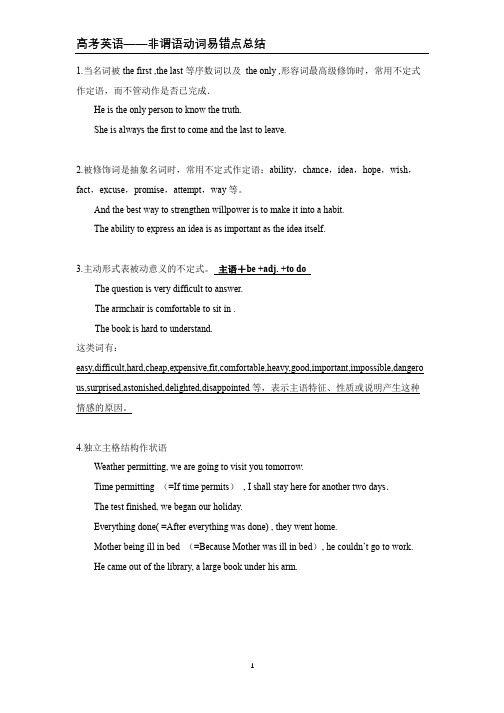
1.当名词被the first ,the last等序数词以及the only ,形容词最高级修饰时,常用不定式作定语,而不管动作是否已完成.He is the only person to know the truth.She is always the first to come and the last to leave.2.被修饰词是抽象名词时,常用不定式作定语:ability,chance,idea,hope,wish,fact,excuse,promise,attempt,way等。
And the best way to strengthen willpower is to make it into a habit.The ability to express an idea is as important as the idea itself.3.主动形式表被动意义的不定式。
主语+be +adj. +to doThe question is very difficult to answer.The armchair is comfortable to sit in .The book is hard to understand.这类词有:easy,difficult,hard,cheap,expensive,fit,comfortable,heavy,good,important,impossible,dangero us,surprised,astonished,delighted,disappointed等,表示主语特征、性质或说明产生这种情感的原因。
4.独立主格结构作状语Weather permitting, we are going to visit you tomorrow.Time permitting (=If time permits), I shall stay here for another two days.The test finished, we began our holiday.Everything done( =After everything was done) , they went home.Mother being ill in bed (=Because Mother was ill in bed), he couldn’t go to work.He came out of the library, a large book under his arm.5.表示感官的动词1感2听,5看feel / hear , listen to / see, watch, notice, observe, look atI heard her sing an English song.I heard her singing an English song when I passed her room.I see him beaten by those bad boys.6. 4个使役动词: have,make,let,get+宾语+宾补(非谓语动词)※ make/let +宾语+ do sth 迫使某人做某事,被动语态为be made to do sth He made me laugh.I was made to laugh by himLet’s go there , shall we ?※ make /let +宾语+done (动词过去分词)(使某事被做)He couldn't make himself heard above the noise of the traffic.Let he clothes washed.※ have +宾语+do sthHe had her go there.※ have+宾语+doing sth 表示动作的执行者为宾语,但是动词必须是持续性动词/延续性动词,后面常接一个时间段He had her standing in the rain for two hoursHe had us laughing all through lunch.※ have +宾语+done 表示叫,让,请别人做某事或遭遇不幸事件I will have my bike repaired this afternoonHe had his wallet stolen at the railway station.He had his pocket picked.※ get +宾语+to do sthHe got his brother to help him.※get +宾语+doing sthHe got his bike running very fast※ get +宾语+doneHe got the car started7.with 的复合结构“With + 复合结构”又称为“with结构”,在句中表状态或说明背景情况,常做伴随,方式,原因,条件等状语。
高中英语高考语法易错知识点10.情态动词(考点梳理+易错点)
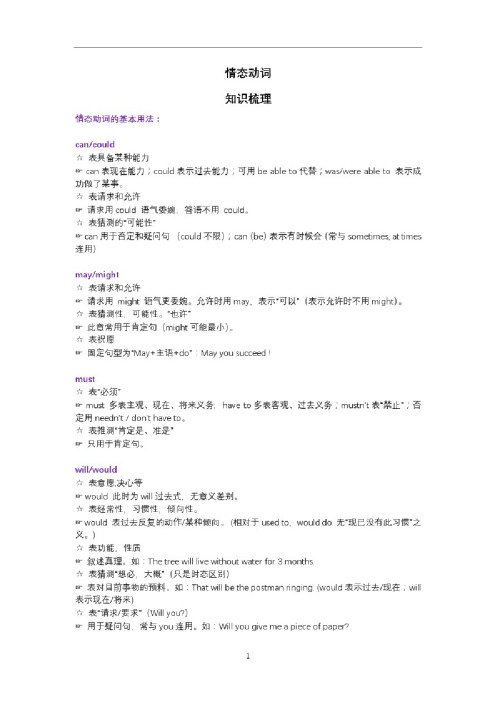
情态动词知识梳理情态动词的基本用法:can/could*表具备某种能力叱can表现在能力;could表示过去能力;可用be able to代替;was/were able to表示成功做了某事。
*表请求和允许叱请求用could语气委婉,答语不用couldo*表猜测的•可能性"吐can用于否定和疑问句(could不限);can(be)表示有时候会(常与sometimes,at times 连用)may/might*表请求和允许计请求用might语气更委婉:,允许时用may,表示•可以11(表示允许时不用might)。
六表猜测性,可能性。
"也许"叱此意常用于肯定句(might可能最小)。
六表祝愿吐固定句型为"May+主语+d。
":May you succeed!must*表“必须"wmust多表主观、现在、将来义务;have to多表客观、过去义务;mustrYt表噤止”;否定用needn't/don't have to。
介表推测。
肯定是、准是.吐只用于肯定句。
will/would六表意愿,决心等w would此时为will过去式,无意义差别。
六表经常性,习惯性,倾向性。
叱would表过去反复的动作/某种倾向。
(相对于used to,would do无"现已没有此习惯”之义。
)*表功能.性质叱叙述真理,如:The tree will live without water for3months.女表猜测11想必,大概•(只是时态区别)吐表对目前事物的预料。
如:That will be the postman ringing(would表示过去/现在;will 表示现在/将来)六表“请求/要求-(Will yoiP)用于疑问句,常与you连用。
如:Will you give me a piece of paper9shall(否:shan't)六表征求意见•…好不好.*用在第一、三人称°如:Shall the reporters wait outside or what9六表允诺、威胁、警告、命令或根据规定有义务做吐用于第二、第三人称。
高考英语词汇语法易错知识点类型例举_高考英语词汇
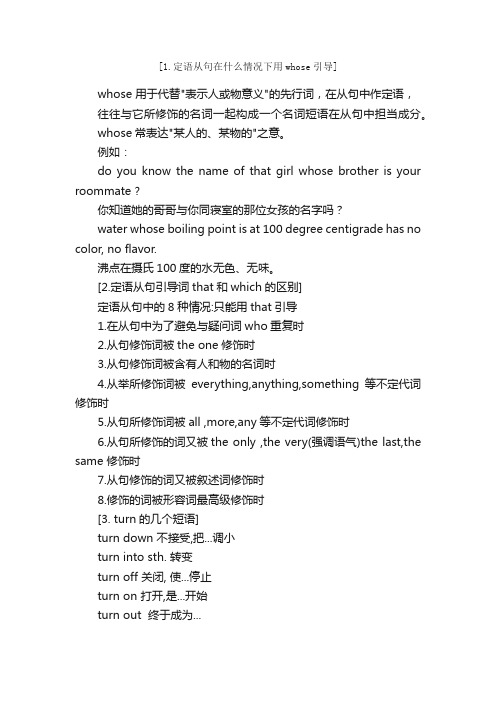
[1.定语从句在什么情况下用whose引导]whose 用于代替"表示人或物意义"的先行词,在从句中作定语,往往与它所修饰的名词一起构成一个名词短语在从句中担当成分。
whose常表达"某人的、某物的"之意。
例如:do you know the name of that girl whose brother is your roommate ?你知道她的哥哥与你同寝室的那位女孩的名字吗?water whose boiling point is at 100 degree centigrade has no color, no flavor.沸点在摄氏100度的水无色、无味。
[2.定语从句引导词that和which的区别]定语从句中的8种情况:只能用that引导1.在从句中为了避免与疑问词who重复时2.从句修饰词被the one修饰时3.从句修饰词被含有人和物的名词时4.从举所修饰词被everything,anything,something等不定代词修饰时5.从句所修饰词被all ,more,any等不定代词修饰时6.从句所修饰的词又被the only ,the very(强调语气)the last,the same 修饰时7.从句修饰的词又被叙述词修饰时8.修饰的词被形容词最高级修饰时[3. turn的几个短语]turn down 不接受,把...调小turn into sth. 转变turn off 关闭, 使...停止turn on 打开,是...开始turn out 终于成为...turn out a light关灯turn over 把...翻转turn up到达以上的turn均为动词词性in turn 逐个的take turn at sth.=take it in turns to do sth.逐个做某事turing转弯口以上的turn为名词词性[4.几个道路的区别]way 范指一切的路path 人或动物踩踏而成的小径street两旁有建筑的road供车辆行驶的highway 公路[5.几个旅游的区别]journey指有明确方向的,长途的,陆路的旅行,通常比较辛苦. travel范指旅行voyage多指海路或空间的长途旅行trip短距离的.又回到出发地的.tour巡游[6.bed的用法]n.[c]be in bed是卧床睡觉the children are in bed.孩子们都在床上呢in the bed是自作自受的意思可以与lie on the bed转换vt.1. 为...提供床铺(或宿处)[(+down)]2. 把...安置在(某种基础上),将...嵌入[o]the bullet bedded itself in the wall.这颗子弹嵌进了墙内。
高考英语 易混易错词汇总结

高考英语易混易错词汇总结(1)1. clothes, cloth, clothingclothes统指各种衣服,谓语动词永远是复数,cloth指布,为不可数名词clothing 服装的总称,指一件衣服用a piece of, an article ofArticle N 文章冠词2. incident, accidentincident指小事件, accident指不幸的事故traffic accidentHe was killed in the accident.Confident :be confident in sth sb self-confident by her self3. amount, numberA number of students are coming out of the school= a lot ofThe number of student is 200 …的数量Amount of sthAmount of water is coming out of the glassamount后接不可数名词,number后接可数名词a number of students4. family, house, homehome 家,包括住处和家人,house房子,住宅,family家庭成员.My family is a happy one.5. sound, voice, noiseSound adj 酣睡的稳固的A sound ladderLose one’s voiceNoisy quietQuite verysound自然界各种各样的声音,voice人的嗓音,noise噪I hate the loud noise outside.6. photo, picture, drawingphoto用照相机拍摄的照片,picture可指相片,图片,电影片,drawing画的画Let's go and see a good picture.7. vocabulary, wordvocabulary词汇,一个人拥有的单词量,word具体的单词He has a large vocabulary.He knows a lot of wordsWord vocabulary phrases/expressions sentences paragraph article8. population, people,personPeoples 民族India has had the largest population in the worldpopulation人口,人数,people具体的人China has a large population.9. weather, climate, temperatureWeather :sunny rainy cloudy windy snowy stormy foggyClimate: dry wet pleasant, uncomfortableTemperature :C FDegree 度数High lowweather一天内具体的天气状况,climate长期的气候状况The climate here is not good for you.10. road, street, path, waypath:迷宫小道message from the pathroad具体的公路,马路,street街道,path小路,小径,way道路,途径take this road and turn right; in the street,show me the way to the museum.11. course, subjectcourse table time tablecourse课程(可包括多门科目),subject科目(具体的学科)a summer course12. custom, habit hobbyinterest N 爱好兴趣he has many interests利益the stock holders share their interests from the stocksV 使。
高考英语知识点易错点总结
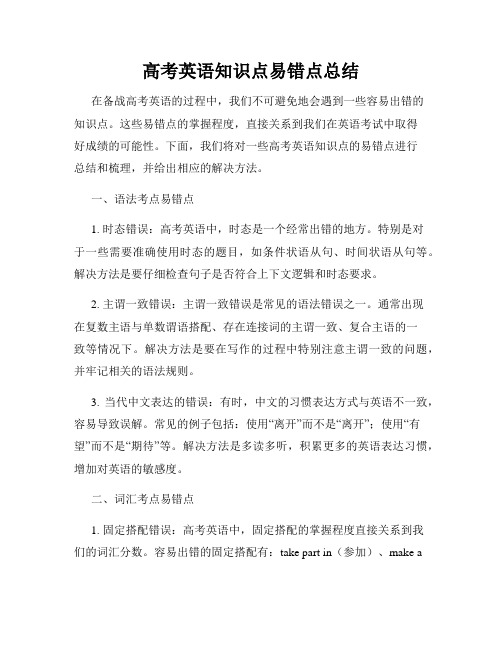
高考英语知识点易错点总结在备战高考英语的过程中,我们不可避免地会遇到一些容易出错的知识点。
这些易错点的掌握程度,直接关系到我们在英语考试中取得好成绩的可能性。
下面,我们将对一些高考英语知识点的易错点进行总结和梳理,并给出相应的解决方法。
一、语法考点易错点1. 时态错误:高考英语中,时态是一个经常出错的地方。
特别是对于一些需要准确使用时态的题目,如条件状语从句、时间状语从句等。
解决方法是要仔细检查句子是否符合上下文逻辑和时态要求。
2. 主谓一致错误:主谓一致错误是常见的语法错误之一。
通常出现在复数主语与单数谓语搭配、存在连接词的主谓一致、复合主语的一致等情况下。
解决方法是要在写作的过程中特别注意主谓一致的问题,并牢记相关的语法规则。
3. 当代中文表达的错误:有时,中文的习惯表达方式与英语不一致,容易导致误解。
常见的例子包括:使用“离开”而不是“离开”;使用“有望”而不是“期待”等。
解决方法是多读多听,积累更多的英语表达习惯,增加对英语的敏感度。
二、词汇考点易错点1. 固定搭配错误:高考英语中,固定搭配的掌握程度直接关系到我们的词汇分数。
容易出错的固定搭配有:take part in(参加)、make adecision(做出决定)、in the end(最后)等。
解决方法是要积累更多的固定搭配,进行词组记忆和复习。
2. 同义词混淆:高考英语中,同义词的使用比较常见。
容易混淆的同义词有:learn/acquire(学习)、easy/simple(简单)、important/significant(重要)等。
解决方法是要通过大量的阅读和写作来熟悉这些同义词的用法。
3. 多音多义词错误:高考英语中,多音多义词的使用要求我们具备较强的语境感知能力。
特别容易出错的多音多义词有:bank(银行/河岸)、bear(熊/忍受)等。
解决方法是要通过大量的阅读积累语境感知能力,并熟练掌握这些多音多义词的正确用法。
三、阅读理解易错点1. 题目定位失误:在阅读理解中,正确地定位问题是解题的关键。
高考英语语法易错点归纳
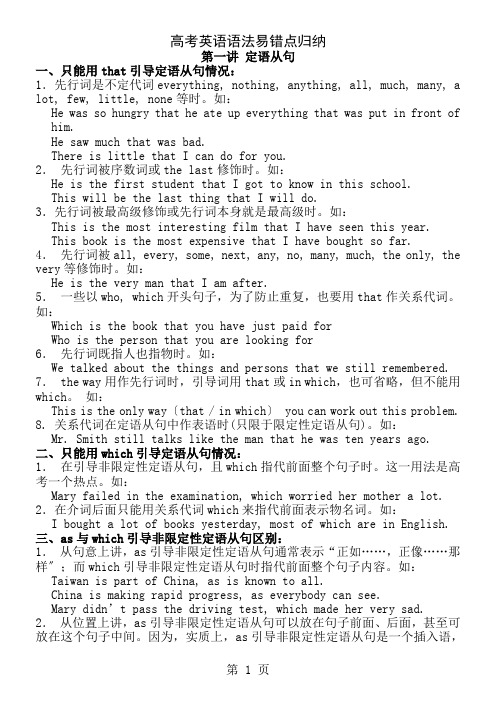
高考英语语法易错点归纳第一讲定语从句一、只能用that引导定语从句情况:1.先行词是不定代词everything, nothing, anything, all, much, many, a lot, few, little, none等时。
如:H e was so hungry that he ate up everything that was put in front ofhim.H e saw much that was bad.T here is little that I can do for you.2.先行词被序数词或the last修饰时。
如:H e is the first student that I got to know in this school.T his will be the last thing that I will do.3.先行词被最高级修饰或先行词本身就是最高级时。
如:This is the most interesting film that I have seen this year.This book is the most expensive that I have bought so far.4.先行词被all, every, some, next, any, no, many, much, the only, the very等修饰时。
如:He is the very man that I am after.5.一些以who, which开头句子,为了防止重复,也要用that作关系代词。
如:W hich is the book that you have just paid forW ho is the person that you are looking for6.先行词既指人也指物时。
如:We talked about the things and persons that we still remembered. 7. the way用作先行词时,引导词用that或in which,也可省略,但不能用which。
高中英语高考语法填空易错点归类整理(共九个)
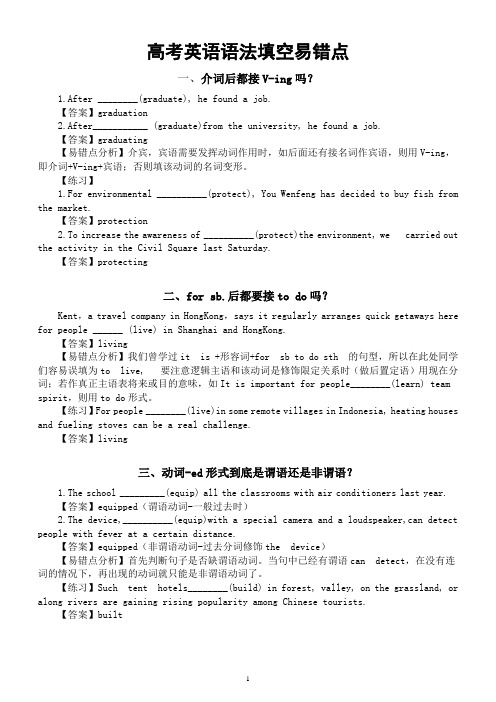
高考英语语法填空易错点一、介词后都接V-ing吗?1.After ________(graduate), he found a job.【答案】graduation2.After___________ (graduate)from the university, he found a job.【答案】graduating【易错点分析】介宾,宾语需要发挥动词作用时,如后面还有接名词作宾语,则用V-ing,即介词+V-ing+宾语;否则填该动词的名词变形。
【练习】1.For environmental __________(protect), You Wenfeng has decided to buy fish from the market.【答案】protection2.To increase the awareness of __________(protect)the environment, we carried out the activity in the Civil Square last Saturday.【答案】protecting二、for sb.后都要接to do吗?Kent,a travel company in HongKong,says it regularly arranges quick getaways here for people ______ (live) in Shanghai and HongKong.【答案】living【易错点分析】我们曾学过it is +形容词+for sb to do sth 的句型,所以在此处同学们容易误填为to live, 要注意逻辑主语和该动词是修饰限定关系时(做后置定语)用现在分词;若作真正主语表将来或目的意味,如It is important for people________(learn) team spirit,则用to do形式。
高考英语非谓语动词易错知识点总结
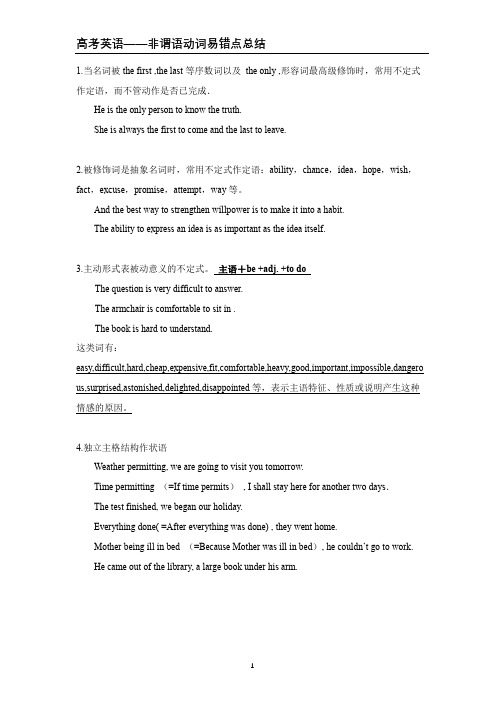
1.当名词被the first ,the last等序数词以及the only ,形容词最高级修饰时,常用不定式作定语,而不管动作是否已完成.He is the only person to know the truth.She is always the first to come and the last to leave.2.被修饰词是抽象名词时,常用不定式作定语:ability,chance,idea,hope,wish,fact,excuse,promise,attempt,way等。
And the best way to strengthen willpower is to make it into a habit.The ability to express an idea is as important as the idea itself.3.主动形式表被动意义的不定式。
主语+be +adj. +to doThe question is very difficult to answer.The armchair is comfortable to sit in .The book is hard to understand.这类词有:easy,difficult,hard,cheap,expensive,fit,comfortable,heavy,good,important,impossible,dangero us,surprised,astonished,delighted,disappointed等,表示主语特征、性质或说明产生这种情感的原因。
4.独立主格结构作状语Weather permitting, we are going to visit you tomorrow.Time permitting (=If time permits), I shall stay here for another two days.The test finished, we began our holiday.Everything done( =After everything was done) , they went home.Mother being ill in bed (=Because Mother was ill in bed), he couldn’t go to work.He came out of the library, a large book under his arm.5.表示感官的动词1感2听,5看feel / hear , listen to / see, watch, notice, observe, look atI heard her sing an English song.I heard her singing an English song when I passed her room.I see him beaten by those bad boys.6. 4个使役动词: have,make,let,get+宾语+宾补(非谓语动词)※ make/let +宾语+ do sth 迫使某人做某事,被动语态为be made to do sth He made me laugh.I was made to laugh by himLet’s go there , shall we ?※ make /let +宾语+done (动词过去分词)(使某事被做)He couldn't make himself heard above the noise of the traffic.Let he clothes washed.※ have +宾语+do sthHe had her go there.※ have+宾语+doing sth 表示动作的执行者为宾语,但是动词必须是持续性动词/延续性动词,后面常接一个时间段He had her standing in the rain for two hoursHe had us laughing all through lunch.※ have +宾语+done 表示叫,让,请别人做某事或遭遇不幸事件I will have my bike repaired this afternoonHe had his wallet stolen at the railway station.He had his pocket picked.※ get +宾语+to do sthHe got his brother to help him.※get +宾语+doing sthHe got his bike running very fast※ get +宾语+doneHe got the car started7.with 的复合结构“With + 复合结构”又称为“with结构”,在句中表状态或说明背景情况,常做伴随,方式,原因,条件等状语。
- 1、下载文档前请自行甄别文档内容的完整性,平台不提供额外的编辑、内容补充、找答案等附加服务。
- 2、"仅部分预览"的文档,不可在线预览部分如存在完整性等问题,可反馈申请退款(可完整预览的文档不适用该条件!)。
- 3、如文档侵犯您的权益,请联系客服反馈,我们会尽快为您处理(人工客服工作时间:9:00-18:30)。
一、定语从句引导定语从句的关系代词有that, which, who (宾格whom,所有格whose)和关系副词where when why 等,关系代词或关系副词在定语从句中充当一个成分,关系代词that,which,who,whom等在从句中分别作主语或宾语,whose 在从句中作定语,而关系副词when,where,why等在从句中作状语。
如:①I will never forget the days when/in which we worked together.②I will never forget the days which/that we spent together.解析:在句①中,表示时间的名词the days在从句中充当的是状语,所以用关系副词when来代指,引导定语从句修饰先行词the days;而在句②中,表示时间的名词the days在从句中充当的是动词spent的宾语,所以用关系代词that 或which来代指。
同样,表示地点或原因的名词如果在从句中作状语,则用关系副词where 或why来代指;如果在从句中作动词的宾语,则用which或that来代替。
如:①This is the factory where/in which I worked.(作状语)②This is the factory that/which I visited years ago.(作宾语)注:当先行词为time,reason, place时,引导词可以省略。
如:① This was the first (when/what) I had serious trouble with my boss.② That is the reason (why) I did it.③ This is the place (where) we met yesterday.另外,定语从句中谓语动词的数应与先行词的数相一致。
如:① Mr. Jackson is the only foreigner that is present at the party.0② He is one of the students who were praised by the teacher.解析:在句①中,先行词foreigner被only修饰,强调只有一个,所以从句中谓语动词用单数形式,而在句②中,who引导的定语从句修饰先行词the students,为复数,所以从句谓语动词应为复数。
感悟:学生之所以在这一点上经常出错,主要是对定语从句的理解不够深刻,分辨不出主句和从句,对句子成分的把握也不到位,搞不清关系代词或关系副词在从句中充当何种句子成分。
所以要做好这一类题,要首先弄清关系代词和关系副词的用法,而且应善于分辨和分析句子结构及其相应成分,这样才能对症下药,快速准确地找到瓿之所在。
二名词性从句中的易错点(一)that引导的定语从句与同位语从句定语从句与前面的的名词是修饰与被修饰的关系,“……的名词”,而同位语从句是用来说明前面名词的内容。
与that从句同位的名词必须是一些表示事实或概念的抽象名词,如fact,news,belief,truth,reply等。
That在定语从句中必须作成分,可用which或who/whom代替,而that在同位语从句中不充当任何句子成分,只起连接作用。
如:①Along with the letter was his promise that he would visit me this comi ng Christmas. ②Do you still remember the chicken farm that we visited three months ago.解析:在句①中,that引导同位语从句解释说明promise的内容,that不充当任何句子成分,只起连接作用,而在句②中,that在其引导的定语从句中作动词visited的宾语,对先行词the chicken farm起修饰作用。
感悟:学生之所以在这一点上容易出错,主要还是因为对定语从句的理解不够深刻,分辨不出that在从句中是否充当了句子成分,因此,还需在句子分析上下功夫,并且搞清何谓同位语从句。
(二)名词性从句中,关于it作形式主语和形式宾语的易错点1. 名词性从句作主语或宾语时,为保持句子平衡,常用it作形式主语或形式宾语。
如:It’s a pity that he don’t come to give a speech.(形式主语)We think it possible that you can finish the job today.(形式宾语)2)谓语动词appreciate, dislike, hate, like, love, make等接由if或when 引导的宾语从句时往往在从句前加上形式宾语it. 例如:I would appreciate it if you could come to my birthday party.3)动词hare, take, hide, punish, put等,后接由that 引导的病因从句式,往往在从句前加形式宾语it.例如:① I take it that you will be leaving Shanghai soon.② we punished it that we had finished the project ahead of time.4)短语动词answer for, count on depend on, insist on, see to等后接有th at引导的宾语从句时,必须冠以形式宾语it.例如:① I’m counting on it that you will come.② She’ll see to it that he goes ahead.注:作形式主语和形式宾语时只能用it.三、代词it、one、that的用法与区别.One泛指,指代前面提到的那类人或物,用于指代可数名词,相当于a+名词单数,其复数形式ones前一般要有定语,否则就要用some.That(those复数)即可指代不可数名词,表特指,相当于the+名词,后面经常与介词修饰语连用。
It指代上文出现的名词,表示同类同物,另外还可表示时间、距离、天气、还可指代人称代词,表示性别身份不明,可作形式主语,形式宾语,引导强调句式以及一些固定搭配,如:get it, catch it, make it.例如:① I have lost my watch. I think I must buy one.我丢了只表,我想我必须再买一只。
(代指上文指到的同类事物,但不指同一个)② Where is my pen? Have you seen it? 我的钢笔不知弄到哪去了,你见了吗?(代指上文提到的同一事物)③ The land of China is larger than that of America.④ Tome has a red pen and a blue one (或two blue ones)⑤ He has no child, and he wants to adopt one (或some)四、虚拟语气I 虚拟语气在if 引导的条件句中的易错点。
① if my lawyer had been here last Saturday, he would have prevented me from going.② if you had studied hard at school, you would be a college student no w.句子①②都是虚拟语气在条件句中的使用,从句中都是假设过去的情况,所以用过去完成时,但在主句中,句①依然指代过去的情况,谓语动词是would h ave done,而②中含有一个表示现在的时间状语now, 这样就必须将其理解为假设现在的情况,所以谓语动词必须为would/should/might+动词原形,学生在这一点上经常会忽略now的存在,从而按句①的形式填写答案。
Ⅱ虚拟语气在名词性从句中的用法1.在it is important (strange, natural, necessary……)+that 句子或者It is de cided (ordered, suggested, demanded, advised……)+that句子中,主语从句中的谓语动词常用(should)+动词原形结构,表示某事“重要”、“必要”、“被决定”等例如:① it is important that everyone (should ) obey the rules all day and all night.② it is decided that the meeting (should) be held tomorrow afternoon.2. suggest, insist 后面指宾语从句时需注意的地方1)①suggest 当“建议”“提出”讲时,其后宾语从句的谓语动词常用“sh ould+动词原形”例如:He suggested that the work (should) be started at once 他建议立即动工。
类似的动词还有insist坚持,demand要求,desire要求、请求,request请求,require要求、需要,order命令,propose建议,command命令,ask要求,advis e建议,prefer宁愿等。
这些动词变被动语态(如:It is suggested + that主语从句)形式后,主语从句谓语动词仍用“(should)+动词原形”这些动词变名词(如suggestion)后,其后的表语从句和同位语从句中的谓语部分仍用“(should)+动词原形”②suggest 当“提出(某看法),暗示,启发”讲时,其后宾语从句的动词不用虚拟语气。
例如:(1)The police suggested that the thief might be one of the fami ly member警察局提出窃贼可能是一名家庭成员。
(2)Her yawns suggests that she is sleepy. 她打哈欠表明她困了。
(3)Although he didn’t suggest that we __ the decision to swim across the river, but his look suggested that our decision __wrong.虽然他没提出我们应该终止游过这条河的决定,但他的表情表明我们的决定是错误的。
